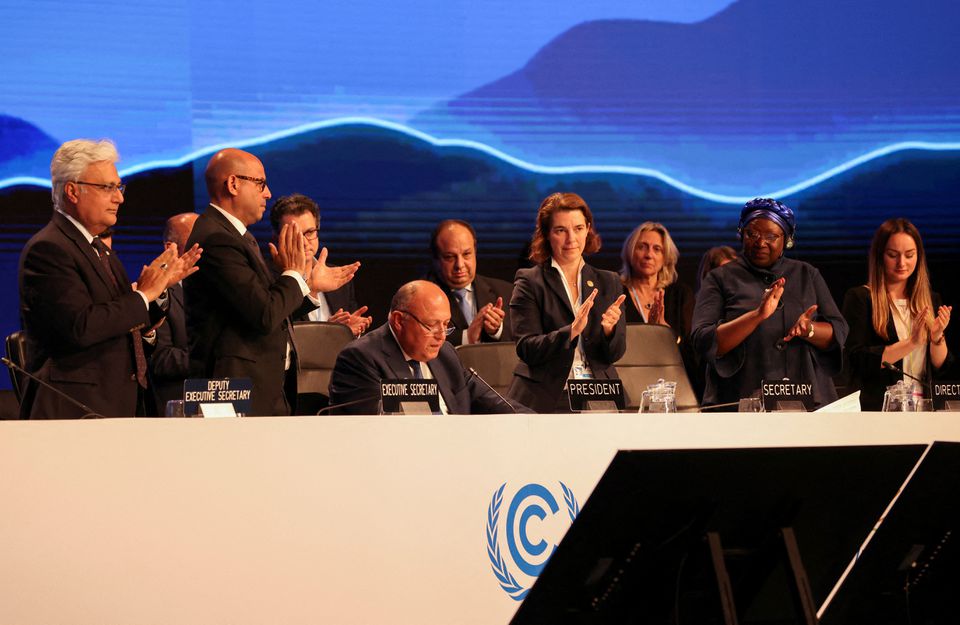
By Anders Lorenzen
As usual, the UN climate talks went yet again into overtime as negotiators and world leaders wrangled over finance.
And as the talks entered into extra time countries tried to overcome key differences and sticking points.
But at the eleventh-hour worries surfaced and there were rumours the talks could be on the verge of collapse. The reason; the draft text released by the hosts, Egypt, had removed the 1.5 degrees C target and instead replaced it with 2 degrees C. This prompted strong reactions from the EU, and other key players saying they were not willing to move away from the 1.5 degree target.
Some analysts saw this as a move to put pressure on rich countries to finally put money on the table for the much-discussed Loss and Damage fund. For years, rich countries have pledged financial support to developing economies to help them cope with the impacts of climate change, but such a fund is still to emerge. As the talks went into extra time it again looked as though there would be no agreement.
Loss and Damage finally become a reality
But late on Sunday morning things had changed, and a compromise deal was struck. It was a deal that was deemed a victory for climate justice, albeit a small one, as there was finally an agreement on Loss and Damage. But while the 1.5 degree target was kept in the final agreement there was no word of cutting emissions which is crucial for that target to be met.
While there was agreement and approval for a Loss and Damage fund, there is still no agreement on how it should be funded, and on who should pay for it. Essentially, it has been kicked into next year’s negotiations, COP28. But while details are still to emerge on the fund, it was still widely celebrated by delegates.
When the dust has settled on this year’s COP, it will likely be seen as performing below par. It was set out to be the COP that would finally highlight the plight of poor countries fighting the most severe impacts of climate change which is primarily caused by wealthy developed economies. There is no doubt that the fund is a step in the right direction but poor countries at the forefront of the climate crisis would clearly have wanted much more.
Fossil fuel language
There are also serious concerns that the deal has actually overall worsened what was agreed upon at last year’s Glasgow Climate Pact – signed post-COP26. The key focus point is to phase out fossil fuels, absolutely necessary for bringing emissions down. The language is the same as was agreed in Glasgow, calling for: ‘the phasedown of unabated coal power and phase-out of inefficient fossil fuel subsidies `.
This language can be viewed in several ways, and the keyword is ‘unabated’ which appears to suggest that it is fine to continue to use and develop coal as long as some kind of carbon capture and storage (CCS) technology is used. It does not even call for the phasing out of fossil fuel subsidies, instead adding the word ‘inefficient’. As with the Glasgow Climate Pact, many wonder what is an `inefficient use of fossil fuel subsidies`, and how does one go about determining what is an efficient and what is an inefficient use of fossil fuel subsidies?
The EU’s climate policy chief, Frans Timmermans, was clearly disappointed with the outcome: “Too many parties are not ready to make more progress today in the fight against climate crisis”, adding that the deal was “not enough of a step forward for people and planet.”
There were also concerns that the door was left open to increasing the use of natural gas with the text including “low-emissions energy”, with worries that it was a result of intense lobbying by big natural gas-producing countries such as Saudi Arabia and Qatar.
The Maldives climate minister, Aminath Shauna, told the plenary: “I recognise the progress we made in COP27″ …. in terms of establishing the fund, but … “we have failed on mitigation … We have to ensure that we increase ambition to peak emissions by 2025. We have to phase out fossil fuel.”
While the outcome of COP27 could have been worse, climate advocates and green groups will have been left increasingly concerned about how little progress has been made and how big a part the acceptance of continued fossil fuel use continues to play at the UN climate negotiations.
This is despite how stark and clear the science is, and despite 2022 having been dominated by extreme weather events worldwide fuelled by our addiction to fossil fuels.
Categories: analysis, climate change, COP27, International Politics, UN
4 replies »